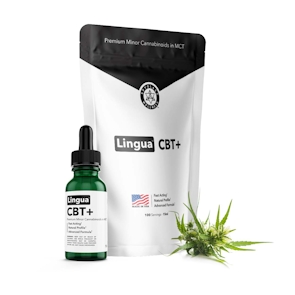
Photo by Connor Fyfe for Herb
Herb’s Guide To CBT: What Is It? What Is It Used For?
Let's explore what this minor cannabinoid is all about. Created with Spyglass Wellness.
It seems like every day you wake up, another cannabinoid has found its way into the market thanks to the extensive research done on the cannabis plant by enthusiasts around the world.
This time around, we’ll be talking about CBT or cannabicitran.
Before we go deep into this cannabinoid, check out Spyglass Wellness’ Lingua CBT+ tincture. If you’re interested in trying CBT, this tincture is your best bet.
Everything You Need To Know About CBT

Photo courtesy of About time / Adobe Stock
Although it seems new to some, the truth is that CBT has been around for quite a while.
It was first isolated in the late 60s and early 70s when researchers found it most commonly appearing in Lebanese hashish, and to this day, it’s most commonly found in hemp.
CBT is more than one particular cannabinoid – scientists have identified nine slightly different types of cannabicitran, all synthesized from CBDa (cannabidiolic acid).
If you’re like us, you’re probably interested in the science-ey side of things too.
To keep it simple, CBT is a phytocannabinoid that holds uniqueness in its chemical structure: a lack of a hydrogen bond donor link.
What does this mean? Well, the compound doesn’t donate hydrogen atoms but accepts them (like your friend that doesn’t often give gifts but receives them often, but hey, we’ve all got our love languages, right?).
Although research is still limited (we’re still waiting on science to catch up with us and federal legalization to make it easier to do so), some studies have given promising results regarding treating life’s unwanted gifts like depression, anxiety, and insomnia.
The mystery surrounding CBT begins to unravel as people discover its benefits and brands cash in a while providing their consumer’s products packed with this cannabinoid that does wonders for all sorts of ailments.
There are some things we know and still so much left to uncover, but that doesn’t mean you can’t enjoy the benefits already.
In fact, you probably already have if you consume CBD, as it’s often mixed in to bring more benefits to the user and create an entourage effect.
CBT For Anxiety

Photo courtesy of motortion / Adobe Stock
If you suffer from anxiety, CBD might already be a godsend to have you feeling more at ease with yourself and aiding in shutting up that pesky internal monologue that does nothing but bring you worries.
Initial studies show that CBT can be helpful for those that suffer from anxiety, bringing a feeling of peace without the psychoactive effects of good, old THC.
CBT For Depression

Photo courtesy of zinkevych / Adobe Stock
Mental illness is no joke, and although weed might not be the cure-all for them, it certainly doesn’t hurt to have its beneficial effects on your side when dealing with depression.
CBT can make the day less insufferable, bringing relief to those who can’t seem to shake the lack of motivation and inherent sadness that depression brings to the table.
CBT For Insomnia

Photo courtesy of tampatra / Adobe Stock
One of the best things about CBT is its ability to help you escape insomnia.
No one likes spending hours at night trying to get some well-deserved shut-eye, only to be left waiting for sleep to set in and ultimately resorting to scrolling through your phone to get out of the boredom.
CBT can be helpful in these cases, making falling asleep a whole lot easier and letting you get a restful night’s sleep to be able to face the day without yawning every few minutes and nodding off at your desk.
Should You Try CBT?
Short answer: heck yeah.
If you want to further the benefits that you already get from consuming CBD, CBT might be a great investment. A product like Spyglass Wellness’ CBT+ tincture is your best bet if you’re out to try this cannabinoid.
Herb Recommended Products:











